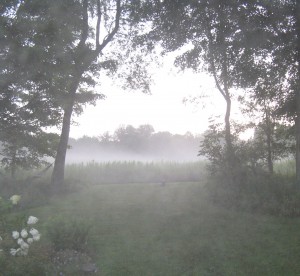 I thought of Deborah Digges this week and her hauntingly beautiful poem ‘Telling the Bees.’ I’ve loved this poem for many years without — as is often the case with poetry — really understanding what it is about. At first read, it seems that the father of a middle daughter has died and that for some reason it’s her job to let the bees know about his passing. But the circumstances mattered far less to me than the music of the language itself: “the honey darkening in the bitter years/the combs like funeral lace or wedding veils/ steeped in oak gall and rainwater/ sequined of rent wings.”
I thought of Deborah Digges this week and her hauntingly beautiful poem ‘Telling the Bees.’ I’ve loved this poem for many years without — as is often the case with poetry — really understanding what it is about. At first read, it seems that the father of a middle daughter has died and that for some reason it’s her job to let the bees know about his passing. But the circumstances mattered far less to me than the music of the language itself: “the honey darkening in the bitter years/the combs like funeral lace or wedding veils/ steeped in oak gall and rainwater/ sequined of rent wings.”
I recently stumbled upon the fact that for centuries it was the custom throughout England and parts of Ireland and Wales for bees to be informed of important events in their beekeepers’ lives — especially a death in the family. If the news was not properly transmitted then it was feared that the bees might stop producing honey or leave the hive. I’m not sure why learning this affected me so deeply. But it was, to use Digges’ words, like “a calling across dreams.” Less a discovery than a recognition of something that I’d already sensed in Digges’ lines. The best poems resonate on many levels.
In an era when word of death is thrust upon us daily over the internet, often with brutal indifference, it’s comforting to remember that there was time when such news was so fraught with significance that even the bees would need to be told. And, perhaps even more remarkable, that they would care.
Telling the Beesby Deborah Digges
1950 – 2009 It fell to me to tell the bees,
though I had wanted another duty—
to be the scribbler at his death,
there chart the third day’s quickening.
But fate said no, it falls to you
to tell the bees, the middle daughter.
So it was written at your birth.
I wanted to keep the fire, working
the constant arranging and shifting
of the coals blown flaring,
my cheeks flushed red,
my bed laid down before the fire,
myself anonymous among the strangers
there who’d come and go.
But destiny said no. It falls
to you to tell the bees, it said.
I wanted to be the one to wash his linens,
boiling the death-soiled sheets,
using the waters for my tea.
I might have been the one to seal
his solitude with mud and thatch and string,
the webs he parted every morning,
the hounds’ hair combed from brushes,
the dust swept into piles with sparrows’ feathers.
Who makes the laws that live
inside the brick and mortar of a name,
selects the seeds, garden or wild,
brings forth the foliage grown up around it
through drought or blight or blossom,
the honey darkening in the bitter years,
the combs like funeral lace or wedding veils
steeped in oak gall and rainwater,
sequined of rent wings.
And so arrayed I set out, this once
obedient, toward the hives’ domed skeps
on evening’s hill, five tombs alight.
I thought I heard the thrash and moaning
of confinement, beyond the century,
a calling across dreams,
as if asked to make haste just out of sleep.
I knelt and waited.
The voice that found me gave the news.
Up flew the bees toward his orchards. For more poems by Deborah Digges, please visit: https://www.poets.org/poetsorg/poet/deborah-digges


Dear Liza,
Thank you for your cogent words regarding this marvelous poem. Being aware of the crucial communication that can exist between beekeepers and bees has made her work even more powerful, more meaningful.
Ms. Digges’ passing was an immense loss to humanity in general and poetry in particular. I only wish I had been her student (I’m a Tufts graduate, but class of ‘73, way before her time).
Kind regards,
Douglas Clark